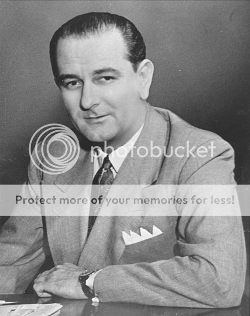
President Lyndon B. Johnson in the 1950s as a US Senator
Every election cycle, Secular Americans have to endure slimy pandering to the religious right by candidates looking to get elected to office. Some on the right of the political spectrum want to see the Johnson Amendment repealed so that churches are free to be involved in politics as much as they want. As it stands now, promises for repealing the law is pandering because it is hardly enforced and it can’t get a repeal vote now in a Congress with a Republican majority.
The Johnson Amendment refers to a change in the US Tax code passed in 1954. It was introduced by then Senator Lyndon B. Johnson and some have said he did it to silence some opponents to his reelection to the Senate.
The IRS interpretation of the code is:
Under the Internal Revenue Code, all section 501(c)(3) organizations are absolutely prohibited from directly or indirectly participating in, or intervening in, any political campaign on behalf of (or in opposition to) any candidate for elective public office. Contributions to political campaign funds or public statements of position (verbal or written) made on behalf of the organization in favor of or in opposition to any candidate for public office clearly violate the prohibition against political campaign activity. Violating this prohibition may result in denial or revocation of tax-exempt status and the imposition of certain excise taxes.
The Restriction of Political Campaign Intervention by Section 501(c)(3) Tax-Exempt Organizations
This means that churches, like all exempted groups, can’t electioneer for a specific candidate. A minister is not suppose to say “God wants us to vote for candidate X…” during Sunday services. The pastor could say “God wants us to vote…“
The Republican nominee for President, Donald Trump called for the repeal of the Johnson Amendment:
In his acceptance speech at the Republican National Convention, presidential candidate Donald Trump singled out “the evangelical and religious community” for their assistance in getting him nominated.
“They have much to contribute to our politics, yet our laws prevent you from speaking your minds from your own pulpits,” he said.
“An amendment, pushed by Lyndon Johnson many years ago, threatens religious institutions with a loss of their tax-exempt status if they openly advocate their political views. Their voice has been taken away,” Trump said. “I am going to work very hard to repeal that language and to protect free speech for all Americans.”
Donald Trump correct — Lyndon Johnson passed legislation limiting political activity of churches
Trump’s call for a repeal is standard for politicians pandering to the religious right. It’s pandering for two reasons.
First, the tax code has rarely been enforced on churches or the religious. In 2014, the Freedom From Religion Foundation (FFRF) settled a lawsuit with the IRS where it promised to start actually enforcing the law.
The code has been used as “proof” of oppression by religious right extremist groups and political conservatives for years even though it was rarely used to revoke an exemption and the IRS acknowledged it dragged its feet for years investigating complaints.
The second reason calling for a repeal is pandering is that unlike a Constitutional amendment, the Johnson amendment is in fact a law and can be changed at anytime by a majority vote in Congress.
Bills to repeal the law has been introduced at least in four of the last five Congresses. The latest attempt H.R. 153 is in committee but has zero chance of being voted on before the 114th Congress ends in January even with Republican majorities in both houses.
Compared to the US House voting over sixty times to repeal “Obamacare”, something everyone knows won’t happen while President Obama is in office, religious “freedom” can’t even get a vote by Republicans who claim to want more of it.
Finally, claims about the Johnson Amendment violating the 1st amendment have never been proven in the courts and the fact that the rule applies to all tax exempt groups under Section 501(c)(3) shows that even though Johnson’s attempt was to punish religious opponents, his amendment has had a positive effect on freedom of religion and the separation of church and state.
The tax exemptions under the code are entirely voluntary. If a church wants to electioneer for a specific candidate, it is free to do so by giving up the exemption. Any burden on religious freedom claimed by religious conservatives is one of their own making.
Check out previous posts about the Johnson Amendment here at Secular Left.